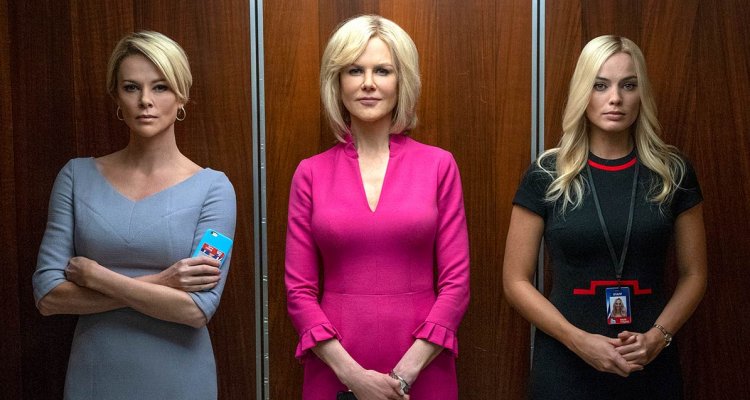“Sushi is not a liberal food.”
“Ask yourself what would scare your grandmother and piss off your grandfather. That’s a Fox story.”
“I’m not a feminist, I’m a lawyer.”
These are just a few of the comically trigger-inducing character lines you will hear in “Bombshell,” Jay Roach’s fast-paced probe into the bowels of Fox News and the sexual harassment scandal that ousted Roger Ailes, the media behemoth’s Chairman and CEO, in July 2016. They mostly play for throwaway laughs, though you still can’t help but feel their double-edged, scheming principle throughout. On one hand, “The Big Short” writer Charles Randolph’s script goes out of its way to legitimize your cringing towards conservative closed-mindedness. (Go ahead and feel free laugh at the other, wrong side of the aisle.) But in doing so, it also inadvertently shrugs off and even validates those right-wing attitudes matter-of-factly, instead of engaging with their darker shades in a deeper sense.
It’s too bad because this approach that lets controversial Fox News figures like Megyn Kelly off-the-hook easily curtails one’s mileage with the story of the women who brought down Ailes (played by John Lithgow with apt exaggeration) in the early days of #MeToo—a non-partisan movement that should of course unambiguously include and protect sexual harassment victims of all stripes. In that, it is a curious choice to define those stripes with broad brushstrokes (and okay, some very impressive prosthetic work) that only scratch the surface. On the whole, don’t expect anything earth-shattering from “Bombshell” when it comes to complex observations on late-era feminism and its place among conservative women. A perishable but reasonably entertaining telling of a watershed moment (set in a time before the Harvey Weinstein scandal even broke), Roach’s picture plays like a tidier, more disciplined “The Big Short,” but with a shakier sense of purpose.
READ MORE: 100 Most Anticipated Films Of 2020
As the trailers already revealed long ago, the most shocking physical alteration of the film belongs to Charlize Theron in the role of the high-power anchor Kelly—it’s a notable feat of not only make-up but also voice and body language transformation, even by the actor’s tireless chameleon-like standards (as a reminder, she did “Atomic Blonde” and “Tully” back to back). In fact, from her sharp-edged jaw-line to deep vocals, Theron is so eerily Megyn Kelly-esque—especially during a scene that recreates the Republican convention in which Kelly calls out Trump on her sexist attitude towards women—that her unrecognizable outer facade sometimes overshadows the more intricate facets of her performance of heavy impersonation.
READ MORE: The 25 Best Films Of 2019
Nicole Kidman as Gretchen Carlson—the former Fox anchor who first sued Ailes for sexual harassment and kick-started the chain of events that lead to Ailes’ departing in just 16 days—does something subtler. Through the film’s shifting timeline structure (Jon Poll’s supple editing keeps things interesting), we follow Carlson’s journey as she politely battles her co-host’s routine sexism, fends off Ailes’ misogyny when she does a make-up-free segment with a feminist message (“No one wants to see a middle-aged woman sweat on TV,” Ailes growls) and waits in uncertainty for other women to come forward.
READ MORE: The 100 Best Films Of The Decade [2010s]
Margot Robbie as the god-fearing, ambitious young conservative Kayla Pospisil—a made-up character, reportedly based on composites of real-life figures—delivers the most layered performance of “Bombshell.” An impressionable woman who leaves Carlson’s segment to join Bill O’Reilly (Kevin Dorff), she soon finds herself behind the locked doors of Ailes’ office, where the mogul routinely harasses the powerless Kayla in exchange of career-advancement promises. In the first of these scenes (that thankfully doesn’t overindulge in graphic sexuality), Robbie’s posture breaks down; her voice trembles and face turns white, proving prosthetics can never quiet substitute for the kind of reactive, quiet emoting she excels at.
Meanwhile, another fictional character, Kate McKinnon’s lesbian producer Jess Carr, enters the picture as Kayla’s romantic interest, offering a welcome (but almost pathetically convenient) departure from conservatism. A liberal and yet a long-time circumstantial Fox employee, Jess walks Kayla through the cubicles, giving her a crash course on the network that sees the outside as a “Jesus-hating, Clinton-controlled, trans-loving Armageddon.” While McKinnon lightens the mood considerably, her character eventually feels like a cheat.
And among all the long tresses and identical-looking sheath dresses that erase female individuality (as one character accurately observes), that duplicity is evident in other parts of “Bombshell,” too. When a liberal shopper confronts Carlson at a supermarket with her distaste of Fox News, her response lectures the viewer about treating those you disagree with decently—as if voicing one’s disapproval of a media figure is unkind or the issues that divide the right and left today aren’t about fundamental values around humanity. In another scene, we watch Kayla question Kelly’s long-time silence—an on-the-nose but emotionally vacant attempt to bring her journey full circle. While “Bombshell” cumulatively paints an accurate portrait of the culture of silence that enables male entitlement against women they see as expandable, it seems unsure of the right way to handle conservative hypocrisies perpetuating that very toxicity. [C+]

